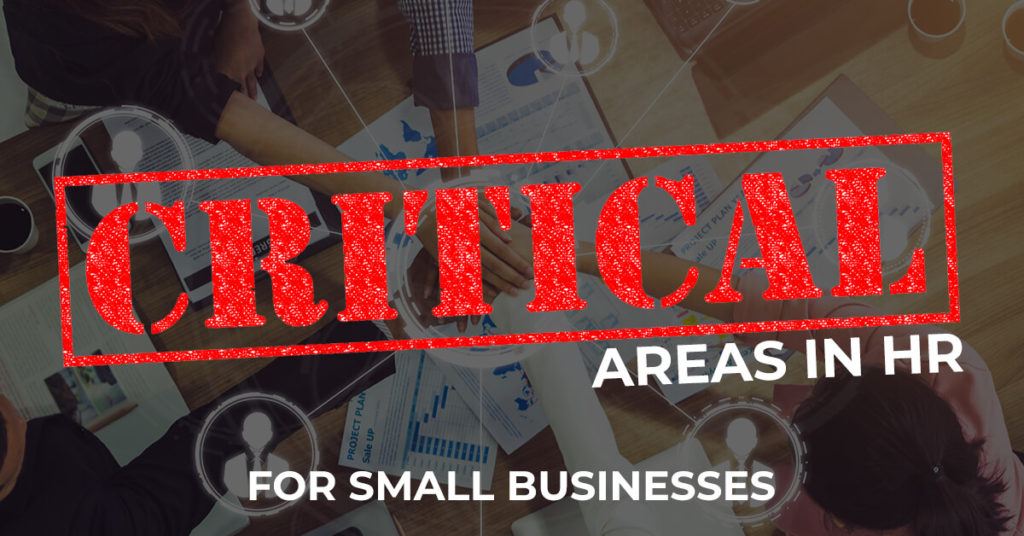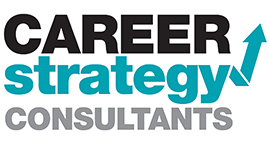Critical Areas in Human Resources for Small Businesses


We’ve always been passionate about helping employers be successful and utilizing best practices for hiring, training, workforce management, HR systems and much more. Having a firm foundation in key areas within Human Resources is vital to the long-term success of any organization, no matter how large or small.
Our latest blog will discuss the most critical areas in Human Resources that small businesses should account for when building your company. These areas include: new hire paperwork (offer letter, employee handbook, benefit election form, application, etc.), I-9 and tax paperwork, job descriptions and position requirements, ethical and legal recruiting practices, payroll processes and programs, and consistently updating existing policies and procedures to remain compliant.
New Hire Paperwork
One of the most common mistakes that small business owners make is to put off getting their staff members fully onboarded and signed up for benefits they’re eligible for upon joining your team. For benefits, if you make the mistake of waiting too long, employees may find an alternative plan or even worse, your best and most loyal employee may terminate their employment because they simply cannot afford the healthcare premiums on their own!

I-9 and Tax Paperwork
The I-9 Form must be completed within 3 days of an employee’s start date and copies of immigration documents must be kept on company file. Tax paperwork should also be ready for each employee once they start. In most cases, the employer is required to withhold taxes from the employee’s pay which are collected by the IRS and sent on behalf of the employers to the appropriate tax authorities.
Job Descriptions and Requirements
A job description should include not only what the job entails, but also its requirements. These should include education level, experience, skills, certifications/licenses as well as training opportunities available to new employees. You want to make sure that you’re spending time training employees on specific soft-skills that are required for them about their job! Many employers get stuck in a “training rut;” this is because they fail to tailor their training to the specific needs of each individual employee.
When advertising a job position in your company, be sure to list down each job requirement needed for that particular role. For example, require Computer Skills 2 years of experience with Microsoft office software or a degree in Entrepreneurship. Employees should be able to clearly identify if they meet all requirements for a given role.
Ethical and Legal Recruiting Practices
This means that you’re not only recruiting for the position, but also the culture of your company. The most critical piece of the recruiting, interviewing, and selection process is conducting each and every aspect as ethically as possible to ensure all qualified candidates receive an equal opportunity to be selected for any opening. The recruiter or hiring manager should be aware of all EEOC and FEPA laws and guidelines. The process should be consistent and fair while representing a high standard of professionalism. Your recruiting practices will define your company and should include continued training, updated guidelines, and a written document which includes best practices.
It’s also important that you’re hiring people with the best interests of your business in mind when doing so. Hiring individuals who are: Professional, Passionate, Ethical & Humble is one way to ensure that you’re able to build a strong and positive business relationship with your employees. Being able to foster this type of a culture is key to long term success in any organization, no matter how large or small.

Payroll Processes and Programs
This one may seem like an obvious one, but there are many small business owners who get bogged down in payroll processes or fail to find the time to train their employees on the various tax programs they use. Knowing your specialized payroll systems and programs is extremely important. A good payroll process is vital to a company’s overall success. Not only will it help you perform essential payroll tasks, but it will also allow you to meet accurate and timely FICA tax, overtime and other obligations. Depending on the size of your company, there could be a variety of different payroll processes. Small employers may choose to outsource payroll services to a professional provider while larger employers may choose to manage their own in-house team. Either way, it is extremely important to have clear processes and a good payroll program.
Updating Company HR Documents
Whether you’re in the process of transitioning an older version of your employee handbook to an updated one or creating new job descriptions for roles in your department, it’s always important to review these documents to ensure they reflect current trends and best practices. These changes may include recognizing LGBTQ+ employees or people with disabilities, updating job descriptions for new software programs, soft-skill learning requirements and the listing of additional benefits.

For more information on HR best practices, expert resources, and helpful tips, check out our blog.
Contact us today to find out how we can help you take advantage of a team of dedicated human resource professionals who are a one-stop shop for all of your hiring needs. We look forward to assisting you!

More Than Just Staffing
For Employers
For Individuals
